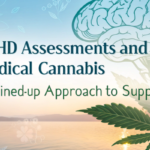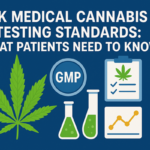Debunking Cannabis Myths: What You Need to Know in 2025

Cannabis remains a topic of intense discussion, frequently misrepresented in media headlines and casual conversations. Despite advancements in scientific research and evolving legislation, as of 2025, misconceptions about cannabis persist. Our goal at Marucanna is to dispel these misconceptions by offering evidence-based insights. This article addresses some of the most common myths surrounding cannabis in the UK, grounded in the latest data and developments.
Myth 1: Cannabis Leads to Harder Drugs
The notion that cannabis use inevitably paves the way to more dangerous substances is a long-standing assumption, often traced back to early 20th-century propaganda. However, contemporary research, including findings from the National Institute on Drug Abuse, indicates no conclusive causal link. While some individuals who use cannabis may experiment with other drugs, the result is not a predetermined outcome. In 2025, with recreational cannabis still illegal in the UK but medical access expanding, evidence suggests that the majority of users do not progress to substances like heroin. Personal circumstances and choices play a far greater role than any inherent “gateway” effect. This myth is firmly dispelled.
Myth 2: Cannabis Impairs Intelligence and Motivation
The stereotype of the idle, unintelligent cannabis user has been perpetuated by popular culture. Yet, a comprehensive 2024 UK Biobank study found no significant correlation between moderate cannabis use and diminished cognitive ability or motivation in adults. While excessive use during adolescence may impact developing brains, potentially affecting memory or concentration, the same risks do not apply to responsible adult use. Notable figures, such as Sir Richard Branson, have used cannabis without compromising their success. The idea that cannabis inherently reduces intellectual capacity is unsupported by evidence and can be dismissed.
Myth 3: Cannabis Overdose Is Impossible
It is true that a fatal cannabis overdose is virtually unachievable, estimates suggest it would require consuming an implausible 6,000 kilograms in 15 minutes. However, in 2025, the rise of high-potency THC products on the UK’s illicit market has redefined “overdose” as an acute, distressing reaction rather than a lethal event. According to data from the NHS, more people are going to the emergency room because they are using cannabis. Strong strains are linked to symptoms like severe anxiety, vomiting (cannabis hyperemesis syndrome), and temporary psychosis. Medical cannabis, regulated since 2018, is carefully dosed to mitigate these risks, unlike unpredictable street products. While not deadly, excessive use can have serious consequences, making these risks a nuanced myth requiring clarification.
Myth 4: CBD Offers No Real Benefits
Critics often dismiss CBD as a placebo, lacking therapeutic value. However, scientific evidence in 2025 refutes this claim. A 2024 study from King’s College London demonstrated CBD’s ability to reduce anxiety by interacting with serotonin receptors, offering measurable benefits. The compound has also gained credibility for treating epilepsy, approved by the NHS since 2019, and shows promise in managing chronic pain. With over 50,000 medical cannabis prescriptions issued in the UK last year, CBD’s role is significant and growing. Far from a placebo, its efficacy is supported by rigorous, peer-reviewed research, dispelling this misconception.
Myth 5: Legalisation Would Create a Nation of Cannabis Users
Proposals to relax cannabis laws, such as the 2024 debate on decriminalising small amounts in Scotland, often provoke fears of widespread overuse. International examples, including Canada and parts of the United States, demonstrate that recreational legalisation does not lead to societal collapse. A 2025 Home Office review found that UK usage rates have remained stable despite medical cannabis being legal since 2018. Public demand focuses more on safe, regulated access than unrestricted consumption. The persistence of illegal markets, fuelled by the ban on recreational use, suggests legalisation could undermine criminal activity rather than amplify usage. This myth lacks foundation.
Myth 6: Cannabis Strains Are Indistinguishable Today
Some argue that modern hybridisation has made cannabis strains uniform. Such an argument overlooks the critical role of terpenes, compounds that define a strain’s aroma and effects, which vary significantly even in 2025. A British Pharmacopoeia report from this year underscores how medically prescribed strains, such as high-CBD varieties for anxiety or balanced THC-CBD options for pain, produce distinct outcomes. While unregulated street cannabis may lack consistency, licensed producers maintain precise control over strain profiles. The diversity of cannabis remains relevant, debunking the idea of homogeneity.
Conclusion: A Clearer Perspective
In 2025, cannabis is neither a vilified menace nor a universal remedy, it is a complex plant supported by science and shaped by policy. The UK stands at a pivotal moment, with medical use expanding rapidly, yet outdated myths persist, often perpetuated by stigma and illicit trade. At Marucanna, our goal is to illuminate the facts, fostering informed understanding.




